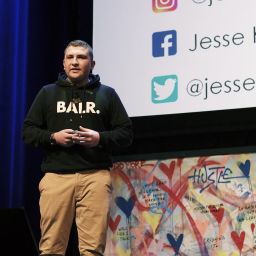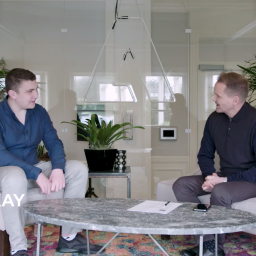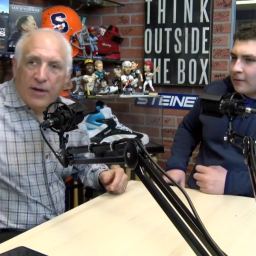A few years ago, Steiner Sports founder and former CEO Brandon Steiner was a guest on my “20 under 20s” podcast. After noting the impact of the podcast on my own brand and digital presence, Brandon—founder of one of the nation’s largest sports memorabilia companies—asked whether I could help him with his social media and digital marketing.
While that may not sound very interesting or maybe even comes across as self-promotional, here’s one important detail I didn’t mention: I was just a 16-year-old kid in high school when we made that podcast, and I was asked to mentor someone with many more years of business experience.
But with the workplace shifting so much, and new, in-demand skills tending toward high tech, it’s not uncommon to see senior leaders on the other side of the mentoring equation.
Whether it’s to learn social media or simply how to engage the next generation, today’s managers and executives are leaning in—and they’re finding Generation Z is there to support. Granted, “reverse mentoring” has been around for a while: Former GE chairman and CEO Jack Welch made a case for it 20 years ago. But with the current leadership generation looking to diversify and modernize their skill sets, Gen Z—digital natives who are entering the workforce en masse—is jumping in and helping them upskill.
In my case, I immediately started interning for Brandon, leaving school at 11 a.m. daily to go into his office. There, I sat in on meeting after meeting, learning everything I could about his brand and business. My goal was to grow his personal social media presence and create projects to get the company’s message out in the greater digital landscape.
Despite my age, I had experience here: In addition to my podcast, for which I marketed my way to 100,000 listeners, I had also grown my personal Instagram page to over 30,000 followers organically. This know-how eventually led me to starting my own company, Vyber Media, which does the same social media work today for pro athletes, Fortune 500 brands, and other businesses.
The Benefits Of Reverse Mentoring
Showing what new tech can do, and teaching how to use it, are just some of things Gen Z can offer by reverse-mentoring. Equally important, Gen Z can provide executives with ultra-modern insights into workplace transformations brought on by technological innovation.
Remote work, for example, is on the rise, with employees increasingly demanding flexible hours. The idea that the best workers need to be in the office before the boss arrives at 8 a.m. and stay until after the boss goes home at 6 p.m. is outdated. If someone works best at 2 a.m. in their pajamas, let them.
I know that might sound far-fetched for older generations, but from my generation’s perspective businesses need to worry less about when or how employees work and focus on whether they’re getting the job done. Embracing that mentality also opens the door to hiring good talent, including contractors, from anywhere. Virtual meetings are as effective as in-person meetings, and with virtual reality and artificial intelligence on the rise, it’s only going to get better. Geography shouldn’t be restricting hires at this point.
Speaking of AI, organizations have only skimmed the surface of its huge potential to increase efficiency. Certain functions that are performed manually because they’ve always been done that way could potentially be handed over to robots, freeing executives to provide higher-level value in other ways. Gen Z can help older executives identify such opportunities to use AI and other technologies in innovative, creative ways.
Two-Way Mentoring Street
Ideally, reverse mentoring is a mutually beneficial arrangement in which executives learn about digital transformation while young people learn about things like leadership, management, and culture building.
I understand the potential skepticism that might arise when a Gen Zer assumes a unique perspective at such a young age without years of “real life experience.” However, it’s important to remember that Gen Z is the first generation with social media and digital technologies at their fingertips from birth. We don’t know life any other way. It’s a unique perspective no other age group has.
From the Gen Z side, young people need to respect the way companies have done things for decades and remember that while they may understand digital, there are other things they don’t know. People are more effective when we have a collaborative mindset, rather than coming in ready to blow things up and tell CEOs everything they’re doing wrong. It’s important to listen, learn, and pay attention to the culture, and then look for a middle ground to try new things while still keeping elements of the old.
I’ve talked to dozens of successful CEOs and entrepreneurs on my podcast and through my company. They all tell me that they want to give back and help a younger generation, but no one actually asks them to. Almost everyone I’ve spoken to has said, “If a kid reached out and said he’d like to shadow me and he’d teach me, I’d be all over it.”
The benefits of reverse mentoring are tremendous to both senior leaders and Gen Z. In my relationship with Brandon, I gave him value on social media and digital marketing, and I learned from him about how to run a company, run meetings, and value employees—countless things that are helping me run my own business today. When reverse mentoring works, everyone wins.
While that may not sound very interesting or maybe even comes across as self-promotional, here’s one important detail I didn’t mention: I was just a 16-year-old kid in high school when we made that podcast, and I was asked to mentor someone with many more years of business experience.
But with the workplace shifting so much, and new, in-demand skills tending toward high tech, it’s not uncommon to see senior leaders on the other side of the mentoring equation.
Whether it’s to learn social media or simply how to engage the next generation, today’s managers and executives are leaning in—and they’re finding Generation Z is there to support. Granted, “reverse mentoring” has been around for a while: Former GE chairman and CEO Jack Welch made a case for it 20 years ago. But with the current leadership generation looking to diversify and modernize their skill sets, Gen Z—digital natives who are entering the workforce en masse—is jumping in and helping them upskill.
In my case, I immediately started interning for Brandon, leaving school at 11 a.m. daily to go into his office. There, I sat in on meeting after meeting, learning everything I could about his brand and business. My goal was to grow his personal social media presence and create projects to get the company’s message out in the greater digital landscape.
Despite my age, I had experience here: In addition to my podcast, for which I marketed my way to 100,000 listeners, I had also grown my personal Instagram page to over 30,000 followers organically. This know-how eventually led me to starting my own company, Vyber Media, which does the same social media work today for pro athletes, Fortune 500 brands, and other businesses.
0










